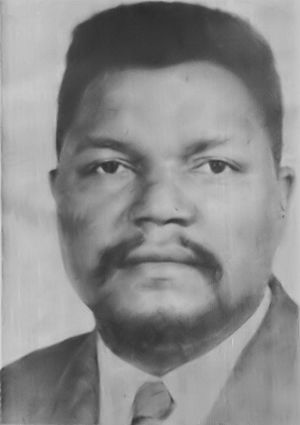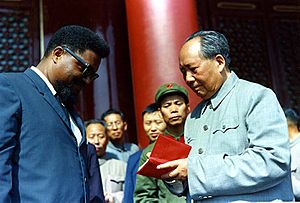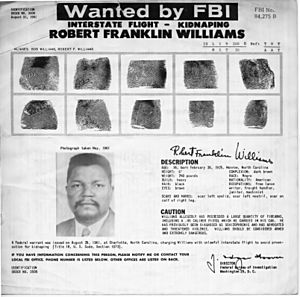Robert F. Williams facts for kids
Quick facts for kids
Robert F. Williams
|
|
|---|---|

Williams in 1961
|
|
| Born |
Robert Franklin Williams
February 26, 1925 Monroe, North Carolina, U.S.
|
| Died | October 15, 1996 (aged 71) Baldwin, Michigan, U.S.
|
| Occupation | Civil rights leader, author |
Robert Franklin Williams (February 26, 1925 – October 15, 1996) was an American civil rights leader. He is best known for leading the NAACP chapter in Monroe, North Carolina during the 1950s. He helped make the local public library and swimming pool open to everyone, regardless of race.
During a time of high racial tension, Williams believed in armed self-defense for Black people in the United States. He also helped two young African-American boys get pardons after they received long sentences. Williams started a rifle club with a charter from the National Rifle Association. This club aimed to protect Black people in Monroe from groups like the Ku Klux Klan.
In 1961, he and his wife left the U.S. for several years. This happened after a white couple got lost in the Black part of Monroe. Police accused Williams of kidnapping them, and the FBI issued a warrant for his arrest. He fled to Cuba and later to China. The charges were dropped when his trial began in 1975, after he returned in 1970.
Williams' book, Negroes with Guns (1962), shared his experiences with racism. It also explained why he disagreed with the non-violent approach of the Civil Rights Movement. His book was very important. Leaders like Black Panther Party founder Huey P. Newton said it was a big inspiration.
Contents
Robert Williams' Early Life
Youth and Family
Robert Franklin Williams was born in Monroe, North Carolina on February 26, 1925. His mother was Emma Carter and his father was John L. Williams, who worked on railroads. Robert had two sisters and two brothers.
His grandmother, who had been a slave, gave him his grandfather's rifle. His grandfather was a Republican and published a newspaper. This was during the difficult years after the Reconstruction period in North Carolina.
As a young man, Williams moved north for factory work during World War II. This was part of the Great Migration. He saw the 1943 Detroit race riot, which was caused by job competition. In 1944, he joined the Marines. He served for about a year and a half in the then segregated military.
Marriage and Children
In 1947, Williams married Mabel Ola Robinson. She was 16 years old and also a civil rights activist. They had two sons, John C. Williams and Robert F. Williams, Jr.
Civil Rights Work
NAACP Activities in Monroe
After serving in the Marines, Williams returned to Monroe in 1955. He joined the local National Association for the Advancement of Colored People (NAACP) chapter. He wanted to end segregation in his town. The local NAACP group was not very active.
Williams was elected president and Dr. Albert E. Perry became vice-president. They brought new energy to the group. First, they worked to integrate the public library. After that success, Williams led efforts to integrate the public swimming pools in 1957. These pools were paid for by taxpayers.
NAACP members organized peaceful protests around the pool. However, opponents shot at their protest lines. No one was arrested or punished, even with police present. At that time, Monroe had a very large Ku Klux Klan chapter. It was said to have 7,500 members in a city of 12,000 people.
The Black Armed Guard
Williams was worried about threats to civil rights activists. He applied to the National Rifle Association (NRA) for a charter. He started a local rifle club called the Black Armed Guard. It had about 50–60 men, many of whom were military veterans. They were ready to defend the Black community from racist attacks.
Newtown was the Black neighborhood in Monroe. In 1957, there were rumors that the KKK would attack Dr. Albert E. Perry's house. Williams and his Armed Guard went to Perry's house to protect it. They even used sandbags for defense. When KKK members appeared and shot from their cars, Williams and his group shot back. They drove the KKK away.
After this event, city officials passed a new rule. It banned the Klan from Monroe without a special permit from the police chief. In his book, Negroes with Guns, Williams wrote that people have a right to defend themselves when the law cannot keep order. He said his group's actions were for defense, not to start a war. He had support from Black military veterans and money from across the country. Threats against Williams and his family became more common.
Freedom Rides and Accusations
Civil rights activist James Forman supported Williams. He helped Williams organize a Freedom Ride in Monroe. In 1961, CORE sent "Freedom Riders" to Monroe. They were campaigning for integrated bus travel between states. The local NAACP chapter was their base. They stayed in Newtown, the Black section of Monroe. Protesters marched daily at the courthouse.
Around this time, a white couple from a nearby town drove into the Black part of Monroe. Other streets were closed due to protests. An angry crowd stopped them. For their safety, they were taken to Williams' home. Williams initially told them they could leave. But he soon realized the crowd would not let them pass safely. He kept the couple in a nearby house until they could safely leave.
North Carolina law enforcement accused Williams of kidnapping the couple. He and his family left the state with police pursuing them. On August 28, 1961, the FBI issued an arrest warrant for Williams. It accused him of fleeing to avoid prosecution for kidnapping. After a wanted poster, signed by FBI director J. Edgar Hoover, was put out, Williams decided to leave the country.
Life in Exile and Return
Living in Cuba
Williams went to Cuba in 1961, traveling through Canada and Mexico. From 1962 to 1965, he broadcast messages to Southern Black people on "Radio Free Dixie". He started this radio station with approval and help from Cuban leader Fidel Castro.
During the Cuban Missile Crisis in 1962, Williams used Radio Free Dixie. He urged Black soldiers in the U.S. military to rebel against the United States. While in Cuba, Mabel and Robert Williams also published a newspaper called The Crusader. He wrote his book Negroes With Guns there. This book greatly influenced Huey P. Newton, who started the Black Panthers.
Time in China

In 1965, Williams and his wife left Cuba and moved to China. He was welcomed there and lived comfortably. He also met with high-ranking Chinese government officials. In China, Williams continued to publish The Crusader.
Williams' wife, Mabel, returned to the United States in September 1969. Williams returned later that year, arriving in Detroit, Michigan. He was immediately arrested to face trial in North Carolina on the kidnapping charge.
Williams' trial took place in Monroe, North Carolina, in December 1975. Famous lawyer William Kunstler represented Williams in court. The State of North Carolina quickly dropped all charges against him.
Later Life and Legacy
Williams passed away at age 71 on October 15, 1996. He was living in Baldwin, Michigan. At his funeral, Rosa Parks, a famous civil rights activist, spoke. She praised Williams for his bravery and his dedication to freedom. Parks said, "The sacrifices he made, and what he did, should go down in history and never be forgotten."
He was survived by his grandsons, Robert F. Williams III and Benjamin P. Williams, and his daughter-in-law, Melanie Williams. His wife, Mabel, lived for 18 more years, passing away on April 19, 2014.
Works by Robert F. Williams
- Negroes with Guns (1962), New York, NY: Marzani & Munsell.
- "USA: The Potential of a Minority Revolution" (1965).
- Listen Brother!. (1968); New York, NY: World View Publishers.
- "The Black Scholar Interviews: Robert F Williams," The Black Scholar, (1970).
- Williams, Robert F. While God Lay Sleeping: The Autobiography of Robert F. Williams (completed 1996, unpublished).
 | Shirley Ann Jackson |
 | Garett Morgan |
 | J. Ernest Wilkins Jr. |
 | Elijah McCoy |


